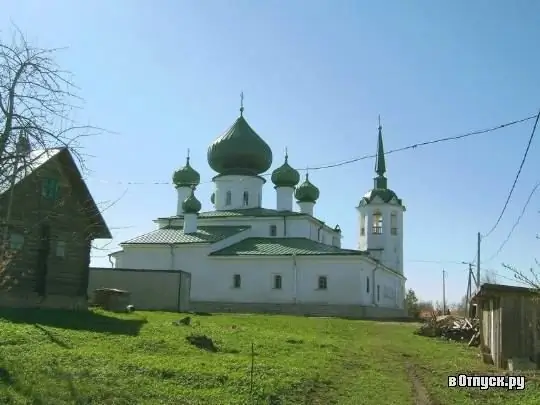
Description of the attraction
The Church of the Nativity of John the Baptist is an active Orthodox church located in the north of Staraya Ladoga, with a pillar-shaped octahedral bell tower and the side-altar of St. Paraskeva Friday.
The temple is a cubic building with four domed pillars, five domes and one seven-sided altar apse. The walls of the church are decorated with flat blades, figured columnar window frames, keeled niches, curbs. The entire decor of the temple is made of bricks. The temple has a side-altar in honor of St. Paraskeva Friday, as well as a bell tower, a refectory and a porch, which all together create a single architectural ensemble, created in 1695.
The emergence of the monastery on Malysheva Gora is associated with the 13th century, since the first mention of it can be found in the annals of 1276. At the same time, Malyshevo was also called - the hill on which the monastery stood. Presumably, before the foundation of the monastery there was a hill or a pagan prayer site on this place.
It is known for certain that this monastery was especially favored by the family of Boris Godunov. The chronicle of 1604 reports that the tsar donated two bells to the monastery, one of which was engraved with the inscription: "Ladoga is the stronghold of my state." On another bell, an inscription was cast, testifying that the bell was cast in 1604 for the feasts of the Ascension of the Lord and the Nativity of John the Baptist.
Until the end of the 17th century, the monastery buildings, including the church, were wooden. According to historical sources, the present temple was built in 1695 on the site of an old wooden one.
For a long time (until the closure in the 20s of the 20th century), St. John's Cathedral was the main Old Ladoga cathedral. It remains so to this day, although quite recently it was threatened with complete destruction. The bell tower began to lean, and the vault of the apse collapsed altogether. It turned out that Malysheva Gora is simply riddled with underground passages. In the 19th century, the peasants of the village here mined quartz sand, which was then sold in St. Petersburg for the production of light bulbs there. The voids formed as a result of sand mining began to threaten the preservation of the architectural and historical monument. Its destruction was stopped by pumping a lot of tons of concrete into the voids of Malysheva Gora.
After the completion of restoration work in 1991. St. John's Church was the first in Staraya Ladoga to return to believers (in the 1920s and 1930s, all Old Ladoga churches were closed). The chapel in honor of Paraskeva Pyatnitsa was decorated with a new iconostasis and wrought-iron candlesticks. Petersburg artists re-painted the walls of the refectory. In the church itself, a multi-tiered iconostasis was re-installed.
Currently, the temple is assigned to the Nikolsky Monastery. Its inhabitants celebrate festive and Sunday liturgies here. The cathedral is a "cathedral" for the inhabitants of Staraya Ladoga. Pilgrims traveling to the Alexander-Svirsky and other distant monasteries often begin their journey to the shrines by visiting the Sunday liturgy in the Nikolsky Monastery of Staraya Ladoga.






